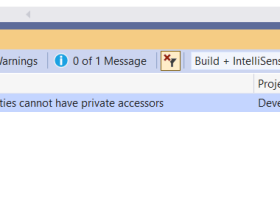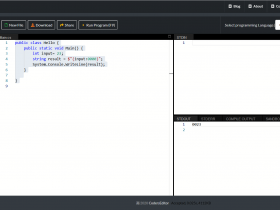C# Error CS1656 – Cannot assign to ‘{0}’ because it is a ‘{1}’
C# Error
CS1656 – Cannot assign to ‘{0}’ because it is a ‘{1}’
Reason for the Error & Solution
Cannot assign to ‘variable’ because it is a ‘read-only variable type’
This error occurs when an assignment to variable occurs in a read-only context. Read-only contexts include iteration variables, variables, and variables. To resolve this error, avoid assignments to a statement variable in using blocks, foreach statements, and fixed statements.
Example 1
The following example generates error CS1656 because it tries to replace complete elements of a collection inside a foreach loop. One way to work around the error is to change the foreach loop to a loop. Another way, not shown here, is to modify the members of the existing element; this is possible with classes, but not with structs.
using System;
using System.Collections;
using System.Collections.Generic;
using System.Text;
namespace CS1656_2
{
class Book
{
public string Title;
public string Author;
public double Price;
public Book(string t, string a, double p)
{
Title=t;
Author=a;
Price=p;
}
}
class Program
{
private List<Book> list;
static void Main(string[] args)
{
Program prog = new Program();
prog.list = new List<Book>();
prog.list.Add(new Book ("The C# Programming Language",
"Hejlsberg, Wiltamuth, Golde",
29.95));
prog.list.Add(new Book ("The C++ Programming Language",
"Stroustrup",
29.95));
prog.list.Add(new Book ("The C Programming Language",
"Kernighan, Ritchie",
29.95));
foreach(Book b in prog.list)
{
// Cannot modify an entire element in a foreach loop
// even with reference types.
// Use a for or while loop instead
if (b.Title == "The C Programming Language")
// Cannot assign to 'b' because it is a 'foreach
// iteration variable'
b = new Book("Programming Windows, 5th Ed.", "Petzold", 29.95); //CS1656
}
//With a for loop you can modify elements
//for(int x = 0; x < prog.list.Count; x++)
//{
// if(prog.list[x].Title== "The C Programming Language")
// prog.list[x] = new Book("Programming Windows, 5th Ed.", "Petzold", 29.95);
//}
//foreach(Book b in prog.list)
// Console.WriteLine(b.Title);
}
}
}
Example 2
The following sample demonstrates how CS1656 can be generated in other contexts besides a foreach loop:
// CS1656.cs
// compile with: /unsafe
using System;
class C : IDisposable
{
public void Dispose() { }
}
class CMain
{
unsafe public static void Main()
{
using (C c = new C())
{
// Cannot assign to 'c' because it is a 'using variable'
c = new C(); // CS1656
}
int[] ary = new int[] { 1, 2, 3, 4 };
fixed (int* p = ary)
{
// Cannot assign to 'p' because it is a 'fixed variable'
p = null; // CS1656
}
}
}





Leave a Review